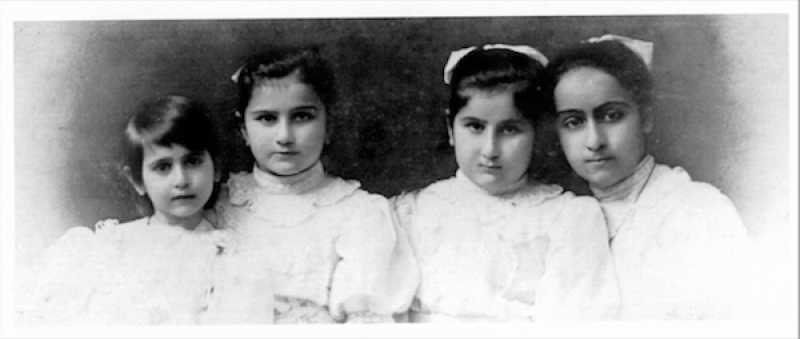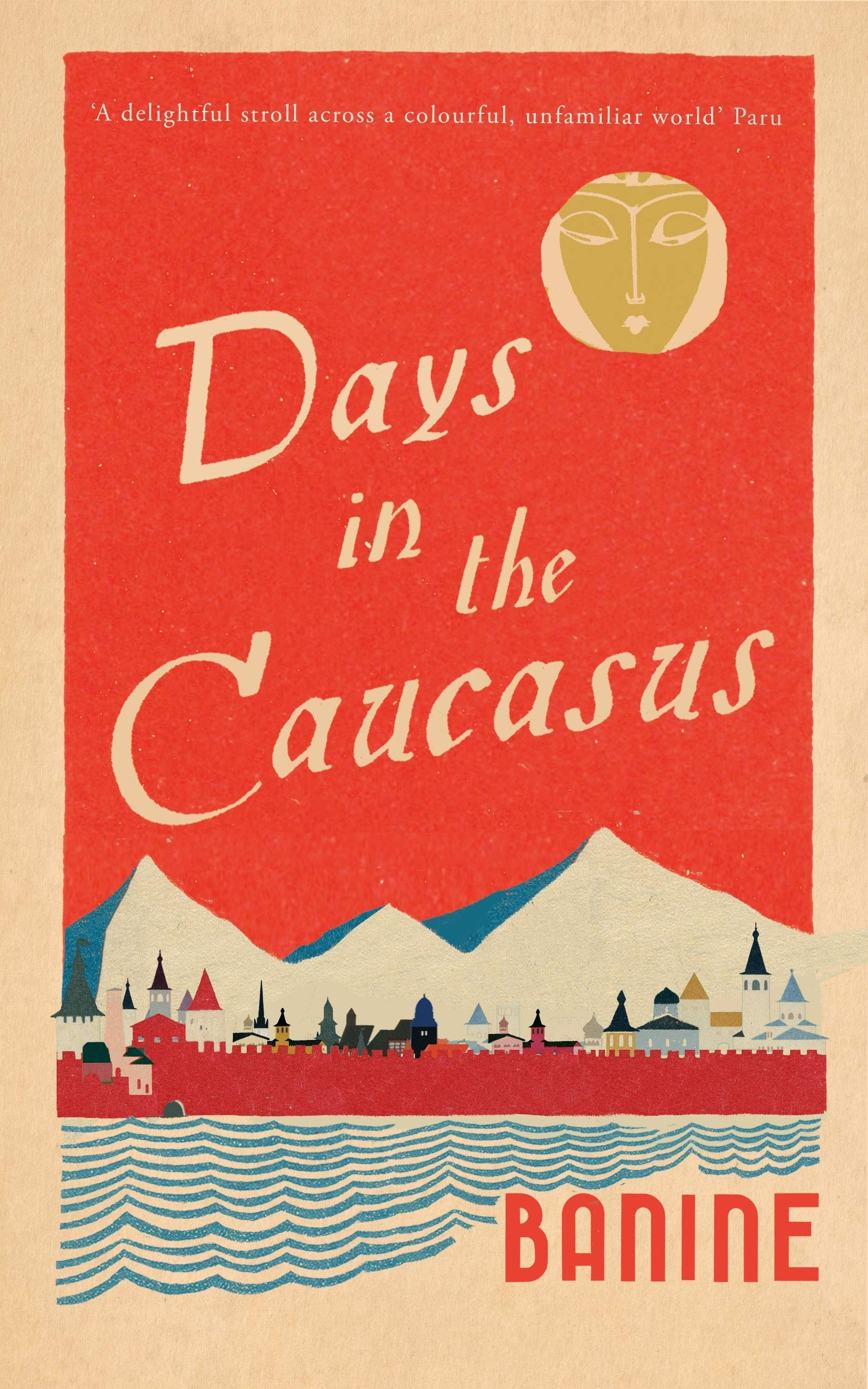Banine: Days in the Caucasus review - revolutions, pogroms and love | reviews, news & interviews
Banine: Days in the Caucasus review - revolutions, pogroms and love
Banine: Days in the Caucasus review - revolutions, pogroms and love
Autobiography of an unusual childhood in Baku

By fifteen Ummulbanu Asadullayeva — or Banine, to call her by the name under which she wrote and translated — had already lived more than most of us will in a lifetime. She’d experienced great love, married, been both a refugee and returnee, survived a pogrom, become a multimillionaire, been divested of that fortune by revolution, and read nearly the entire contents of her Aunt Rena’s library.
Days in the Caucasus, the autobiography of her childhood, written in French and published in her adopted country France in 1945, concerns itself with the personal earthquakes as much as the political. The two, after all, were too close to separate. She was born in 1905 to a family of Azerbaijani millionaires whose oil wealth stretched back only as far as her peasant-born grandfather. A bookish child, the youngest of four sisters, she was given to dreaminess and animism — at the family holiday house on the Absheron Peninsula she counted vines, rocks and trees among her friends. She was one of a generation who grew up in a twilight between traditional Muslim mores and an influx of Western (and Russian) manners, and who saw the rise and almost immediate fall of an independent Azerbaijan.
 She paints a portrait of a fabulous, lost world on the permanent cusp of change in which extremes reign and nothing is as straightforward as it first appears. Baku’s new-found oil wealth had upended social hierarchies, jettisoning her peasant grandfather into the upper echelons of society while losing none of his coarse (as she considered them) habits. Oil money opened the country to Western and modernising influences rendering devout Muslims deft hypocrites who “without regret” threw off constraints developed for a peaceful — but not a contemporary — life. “Is wine forbidden by the prophet? People made up for it by drinking spirits — vodka, brandy — on the false pretext that it wasn’t wine. Reviled too was the reproduction of the human image, but the photographers were overwhelmed with customers”.
She paints a portrait of a fabulous, lost world on the permanent cusp of change in which extremes reign and nothing is as straightforward as it first appears. Baku’s new-found oil wealth had upended social hierarchies, jettisoning her peasant grandfather into the upper echelons of society while losing none of his coarse (as she considered them) habits. Oil money opened the country to Western and modernising influences rendering devout Muslims deft hypocrites who “without regret” threw off constraints developed for a peaceful — but not a contemporary — life. “Is wine forbidden by the prophet? People made up for it by drinking spirits — vodka, brandy — on the false pretext that it wasn’t wine. Reviled too was the reproduction of the human image, but the photographers were overwhelmed with customers”.
Closer to home, her family’s behaviour oscillated wildly between entrenched habits and utterly unpredictable turns. Her miserly grandfather, Musa, returned in hale health from his kidnapping — the hospitality of Azerbaijani kidnappers being legendary — and on his death was found to have given away vast sums to educate poor boys. Her devout grandmother’s knowledge of scurrility paraded itself in frequent and colourful invectives, she and her sisters fell “like skittles” for the White Russians and other émigrés who wash up in Baku during the revolution, and while gambling is prohibited, Banine, along with much of the city and all of her female relatives, was an inveterate card shark.
The sharp, witty humour with which she conveys this colourful cast and rambunctious environment hints at just how close tragedy hovered during this decade and a half of monumental change. Humorous episodes and terrible revelations alike, her playful narration defuses the threat that drives the freneticism of both kinds of event. Her account of hiding terrified during a pogrom in an Armenian neighbour’s house while Dashnak militia raped, killed and looted, is leavened by her recollection of the “flood of lentils” cheerfully pressed upon them by their enthusiastic hosts. When she and her family escaped to Persia by tanker across the Caspian, the transmutation of her fear into relief and thence gigantic appetite is first emotionally analysed (“Suddenly you enter a world where your fears stop abruptly and are no longer relevant”) and then wickedly sent up when nothing she eats can be kept down (“I turned from pink to green, joyous to nauseous… And it all ended up in the lavatory bowl.”)
It’s lively surviver’s optimism, the kind that relates tales with verve and relish. But as a Roman Catholic convert who wrote and thought in French, Banine — like many other émigrés (or refugees) — felt totally separate from her past: “I’m surprised to realise that this part-oriental, part-German and later, Russian childhood is my own; that the dreamy, withdrawn and rather naughty girl is me. All these dredged up memories seem borrowed: it’s hard to believe they’re mine.” Humour becomes another way of distancing herself from a childhood that was hardly short on entertainment but no less difficult for it. Yet occasionally, terrible things collapse the decades — such as when her friend Tamara recounts how she and Banine’s mischievous cousins, Asad and Ali, played at “rape the Armenian”; Banine’s idiosyncratic description of her horror (“I was an exclamation mark,”) carries across the years with all of its force intact.
Banine’s witty observations puncture pieties and preconceptions. She has a wickedly whetted tongue, and enough self-awareness to refuse sparing herself from her own reflections (“he would be too upset to eat his sardines and I would polish them off, bones, skin and all”). Her writing is gorgeously translated (from the French) by Anne Thomson-Ahmadova who spent twenty years living in Baku and it’s only to be hoped that more of her works are translated as a result.
- Days in the Caucasus by Banine is published by Pushkin Press at £16.99 hardback
- Read more book reviews on theartsdesk
Add comment
The future of Arts Journalism
You can stop theartsdesk.com closing!
We urgently need financing to survive. Our fundraising drive has thus far raised £49,000 but we need to reach £100,000 or we will be forced to close. Please contribute here: https://gofund.me/c3f6033d
And if you can forward this information to anyone who might assist, we’d be grateful.

Subscribe to theartsdesk.com
Thank you for continuing to read our work on theartsdesk.com. For unlimited access to every article in its entirety, including our archive of more than 15,000 pieces, we're asking for £5 per month or £40 per year. We feel it's a very good deal, and hope you do too.
To take a subscription now simply click here.
And if you're looking for that extra gift for a friend or family member, why not treat them to a theartsdesk.com gift subscription?
more Books
 'We are bowled over!' Thank you for your messages of love and support
Much-appreciated words of commendation from readers and the cultural community
'We are bowled over!' Thank you for your messages of love and support
Much-appreciated words of commendation from readers and the cultural community
 Natalia Ginzburg: The City and the House review - a dying art
Dick Davis renders this analogue love-letter in polyphonic English
Natalia Ginzburg: The City and the House review - a dying art
Dick Davis renders this analogue love-letter in polyphonic English
 Tom Raworth: Cancer review - truthfulness
A 'lost' book reconfirms Raworth’s legacy as one of the great lyric poets
Tom Raworth: Cancer review - truthfulness
A 'lost' book reconfirms Raworth’s legacy as one of the great lyric poets
 Ian Leslie: John and Paul - A Love Story in Songs review - help!
Ian Leslie loses himself in amateur psychology, and fatally misreads The Beatles
Ian Leslie: John and Paul - A Love Story in Songs review - help!
Ian Leslie loses himself in amateur psychology, and fatally misreads The Beatles
 Samuel Arbesman: The Magic of Code review - the spark ages
A wide-eyed take on our digital world can’t quite dispel the dangers
Samuel Arbesman: The Magic of Code review - the spark ages
A wide-eyed take on our digital world can’t quite dispel the dangers
 Zsuzsanna Gahse: Mountainish review - seeking refuge
Notes on danger and dialogue in the shadow of the Swiss Alps
Zsuzsanna Gahse: Mountainish review - seeking refuge
Notes on danger and dialogue in the shadow of the Swiss Alps
 Patrick McGilligan: Woody Allen - A Travesty of a Mockery of a Sham review - New York stories
Fair-minded Woody Allen biography covers all bases
Patrick McGilligan: Woody Allen - A Travesty of a Mockery of a Sham review - New York stories
Fair-minded Woody Allen biography covers all bases
 Howard Amos: Russia Starts Here review - East meets West, via the Pskov region
A journalist looks beyond borders in this searching account of the Russian mind
Howard Amos: Russia Starts Here review - East meets West, via the Pskov region
A journalist looks beyond borders in this searching account of the Russian mind
 Henry Gee: The Decline and Fall of the Human Empire - Why Our Species is on the Edge of Extinction review - survival instincts
A science writer looks to the stars for a way to dodge our impending doom
Henry Gee: The Decline and Fall of the Human Empire - Why Our Species is on the Edge of Extinction review - survival instincts
A science writer looks to the stars for a way to dodge our impending doom
 Jonathan Buckley: One Boat review - a shore thing
Buckley’s 13th novel is a powerful reflection on intimacy and grief
Jonathan Buckley: One Boat review - a shore thing
Buckley’s 13th novel is a powerful reflection on intimacy and grief
 Help to give theartsdesk a future!
Support our GoFundMe appeal
Help to give theartsdesk a future!
Support our GoFundMe appeal
 Jessica Duchen: Myra Hess - National Treasure review - well-told life of a pioneering musician
Biography of the groundbreaking British pianist who was a hero of the Blitz
Jessica Duchen: Myra Hess - National Treasure review - well-told life of a pioneering musician
Biography of the groundbreaking British pianist who was a hero of the Blitz

Comments
Great translation.